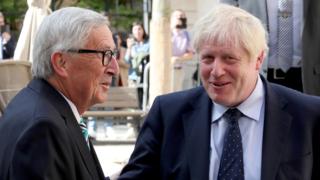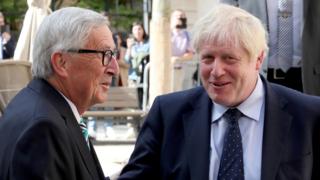What is in the new Brexit deal?
A revised Brexit deal has been agreed by the UK and EU. What does it contain? …

 Image copyright Reuters
Image copyright Reuters A revised Brexit deal has been agreed by the UK and EU. What is in it?
All sides want to avoid the return of a “hard border” after Brexit between Northern Ireland and the Republic of Ireland – with checks and infrastructure which could be targeted by paramilitary groups.
Coming up with solutions to this – acceptable to all sides – has been very challenging.
The new protocol replaces the controversial Irish backstop plan in Theresa May’s deal. Much of the rest of that deal will remain.
Here are some of the key new parts:
What does the deal mean for Northern Ireland?
The whole of the UK will leave the EU customs union. This means the UK will be able to strike trade deals with other countries in the future.
There will be a legal customs border between Northern Ireland and the Republic of Ireland (which stays in the EU). But in practice the customs border will be between Great Britain and the island of Ireland, with goods being checked at Northern Irish ports.
Duty (tax) won’t automatically have to be paid on goods coming into Northern Ireland from Great Britain.
But where something is “at risk” of then being transported into the Republic of Ireland (which is part of the EU customs union), duty will be paid.
A joint committee made up of UK and EU representatives will decide at a later date what goods should be on the list.
It might be that duty is paid on goods that do not end up being sent on from Northern Ireland into the EU. The UK would be responsible for whether to refund the duty in these circumstances.
Ordinary people won’t have their baggage checked and duty won’t apply to individuals sending goods to other people.
There will also be limits agreed by the joint committee on the amount of help the government can give to Northern Irish farmers. The figure will be based on the amount they currently receive from the EU’s Common Agricultural Policy.
Who enforces EU rules?
This will be done by UK officials at Northern Irish ports, but the EU will have the right to have its own officials present.
It seems those EU officials may be able to overrule UK officials. “Where the Union representative requests the authorities of the United Kingdom to carry out control measures in individual cases for duly stated reasons, the authorities of the United Kingdom shall carry out those control measures.”
Does Northern Ireland get a say?
Because Northern Ireland will be set apart from the rest of the UK when it comes to customs and other EU rules, the deal gives its assembly a chance to vote on these provisions.
After four years, Northern Ireland will have the opportunity to vote on customs and state aid rules.
If the Northern Irish Assembly votes against them, they would lose force two years later during which time the “joint committee” would make recommendations to the UK and EU on “necessary measures”.
If the Assembly accepts the continuing provisions by a simple majority, they will then apply for another four years. If the deal has “cross-community support” then they will apply for eight years, or until a new agreement on the future relationship is reached if that comes sooner.
The deal defines cross-community support as at least 51% each of unionist and nationalist Assembly members voting in favour, or at least 40% of members from each designation if in total at least 60% of members have voted in favour.
What has been agreed on VAT?
The new agreement says that EU law on value added tax (VAT – a tax added when you make purchases) will apply in Northern Ireland, but only on goods, not services.
But it also allows Northern Ireland to have different VAT rates to the rest of the UK, which would not normally be allowed under EU law.
For example, if the UK decided to reduce the VAT on household fuel to zero, Northern Ireland would still have to keep it at 5%, which is the EU minimum.
It also means that Northern Ireland may get the same VAT rates on certain goods as the Republic of Ireland, to stop there being an unfair advantage on either side of the border.
What claims do you want BBC Reality Check to investigate? Get in touch




